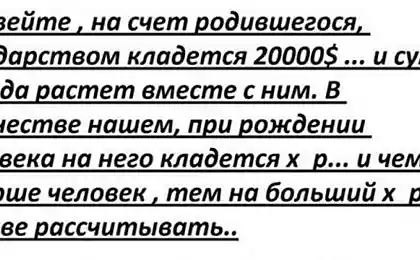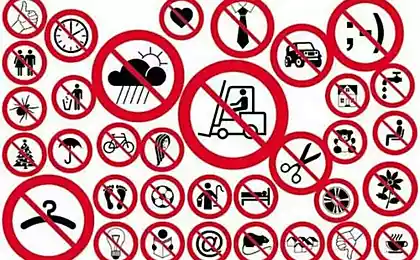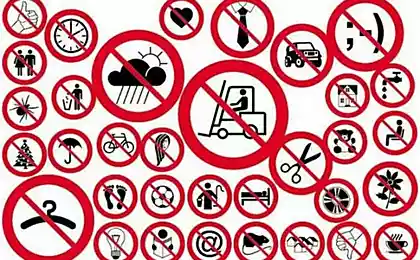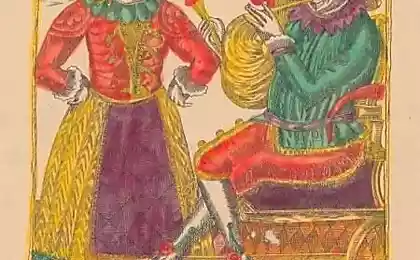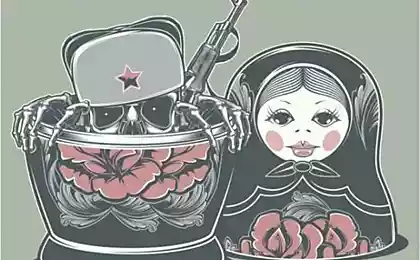573
Russian expressions with a hidden meaning
Often we say common phrases without understanding their meaning. Why, for example, say "a stitch"? Who is "Smoking"? Why, finally, on offended water carry? We will reveal the hidden meaning of these expressions.
A stitch
"Wet", we're talking about extreme poverty. But this is saying to the birds is irrelevant. While ornithologists argue that the falcons do during molting lose their feathers and become almost naked! "The Falcon" in old Russia was called a battering RAM, an instrument of iron or wood in the shape of a cylinder. It was hung on chains and swung, thus punching the walls and gates of fortresses of the enemy. The surface of this weapon was smooth and sleek, quite simply, naked. The word "Falcon" in those days was called the instruments of cylindrical shape: scrap iron, pestle for grinding grain in a mortar, etc. Sokolov in Russia actively used until the advent of firearms in the late XV century.
Fifty three million eight hundred thirty five thousand nine hundred
Alive and kicking
"Alive and kicking!"expression of an old Russian children's game "Smoking room". The rules were simple: participants sit in a circle and gave each other a lighted torch, saying: "Alive, alive and kicking! Legs contiki, soul Korotenko". The one in whose hand torch went out, out of the circle. It turns out that "Smoking" is not the same person as one might think, and the burning sliver, which in ancient times covered the hut. It barely burned and smoked, as if saying "smoked". Alexander Pushkin did not miss the chance to take advantage of this linguistic ambiguity in the epigram on the critic and journalist Michael Kochanowskiego:
— As! still alive and Kicking journalist?
Well! still dry and boring,
And rude, and foolish, and envy rasmusen,
All snuggle into your filthy sheet
Old nonsense, and absurd new.
— Boo! tired of Kicking journalist!
How to extinguish stinking splinter?
How to kill the Smoking room my?
I need some advice. Yes... spit on him.
Hot spot
The expression "hot spot" is found in the Orthodox funeral prayer ("in the space zlacinim in place pokoyem..."). So in the texts in the Church Slavonic language is called Paradise. Ironically reinterpreted the meaning of this expression raznochintsy-democratic intelligentsia of the times of Alexander Pushkin. Language game was that our climate does not allow to grow grapes, so in Russia, alcohol drink made mainly from grain (beer, vodka). In other words so hot – drunk.
On offended water carry
There are several versions of origin of this saying, but the most plausible seems to be the one connected with the history of St. Petersburg water carriers. The price of imported water in the nineteenth century was about 7 cents silver per year, and of course there were always greedy merchants who inflated the price to cash in. For this illegal act, such would-be entrepreneurs took the horse and forced to carry barrels in the truck for yourself.
Shabby view
The expression that appeared under Peter I and was associated with the name of the merchant Zatrapeznov, Yaroslavl linen manufactory which produced both silk and wool, in no way inferior in quality to the products of foreign factories. In addition to factory made and very very cheap hemp striped fabric – petrad, "satrapes" (rough to touch), which was on mattresses, trousers, tunics, women's scarves, smock and shirt. And if rich people like this robe was a home clothes, then the poor things from satrapes clothing was considered "out". Shabby view talked about the low social status of the person.
Each Sitno
It is believed that other so called by analogy with sitnam bread, usually wheat. To prepare this bread uses flour is more finely ground than in rye. To remove impurities from it and to do culinary product more “air”, not used a sieve and a device with smaller cell — strainer. So the bread and called sitnam. It was expensive, it was considered a symbol of wealth and was exhibited on the table treats for the most important guests. The word "Sitno" in relation to the other means "Supreme test" of friendship. Of course, this turnover is sometimes used in an ironic tone.
7 Fridays of the week
In the old days, Friday was market day, which was made to execute various trading obligations. On Friday, goods received, and the money he agreed to give the next market day (Friday next week). Violators similar promises, said that they have seven Fridays in the week. But this is not the only explanation! Friday was early considered free from work during the day, so such a phrase characterized the bum, whose every day is a day off.
Where Makar calves did not drive
One version of the origin of this adage is this: Peter was in a working trip to the Ryazan land and "informal" contact with people. It so happened that all encountered him in the ways of men said Macari. The king at first was very surprised, and then said: "to Be the same to all of you from now on, Macari!"Supposedly since then, "Makar" has become a collective image of the Russian peasant and farmers (not only in Ryazan) were called Macari.
Sharashkina office
Its peculiar name office received from the dialectal word "Sarang" ("scum", "rabble", "the rogues"). In the old days the so-called questionable Association of crooks and liars, and today it's just "disreputable, unreliable" organization.
By hook or by crook
In the old washerwoman-mistresses knew well-laminated linen is fresh, even if the washing is not produced brilliantly. Therefore, sinned in the wash, they achieved the desired impressions "by hook or by crook".
Drunk as a goat
This expression we find in Alexander Pushkin's novel in verse "Eugene Onegin" when it comes to neighbor Lensky — Zaretsky:
Horse Kalmyk sales,
As the drunken goat, and the French
Got captured…
The fact that in the Pskov region, where Pushkin has long been in exile, "zusa boys," called the pig. Generally "the drunken goat" analog colloquial expression "drunk as a pig".
To divide a skin of not killed bear
It is noteworthy that in the 30-ies of XX century in Russia it is accepted to speak: "Sell the skin of not killed bear". This version of the expression seems to be more close to the original, and more logical, because "divided" skins no good, it is valued only when it remains intact. Source — the fable "the bear and the two comrades" of the French poet and fabulist Jean La Fontaine (1621 -1695).
Dusty profit
In the XVI century during the fisticuffs dishonest soldiers took with them the sandbags, and at the decisive moment of the fight threw it into the eyes of opponents. In 1726 this technique was forbidden by a special decree. Currently viagenie "to throw dust in the eyes" is used to mean "to create a false impression about their capabilities".
Promised three years of waiting
According to one version, a reference to the text of the Bible to the book of Daniel. It says: "blessed is he who waits and comes to the thousand and five and thirty days," i.e. three years and 240 days. The biblical call to patient waiting has been playfully reinterpreted in the people, because the saying is: "the Promised three years of waiting, and the fourth denied".
Retired goats drummer
In the old days from the troupes main actor was a scientist trained bear, behind him marched, "goat", disguised with goat skin head and only "goat" – the drummer. His task was to beat a makeshift drum, calling the audience. To be interrupted by casual earnings or handouts – rather unpleasant, and then there's the "goat" is not a real, retired.
Jingoism
The expression introduced in a figure of speech Peter Vyazemsky. Under jingoistic patriotism means blind adherence to outdated and ridiculous "traditions" of national life and peremptory rejection of another, foreign, "not our".
Good riddance
In one of the poems of Ivan Aksakov, you can read about the way that "straight as an arrow, broad surface that the tablecloth is laid down". So in Russia was off on a long journey, and no evil sense they have not invested. This is the original meaning of the idiom is present in the Explanatory dictionary Ozhegova. But it is said that in contemporary language the expression is meaning the opposite: "the Expression of indifference to someone's care, leaving and also the desire to get out there, anywhere." A great example of how ironically reinterpreted in the language of sustainable etiquette.
To shout in all Ivanovo
In the old square in the Kremlin, on which stands the bell tower of Ivan the Great, was called Ivanovo. The clerks announced decrees, orders and other documents relating to residents of Moscow and of all Russia's peoples. That all was well heard, the clerk was reading very loudly, screaming in all Ivanovo.
To crack a man
The expression to crack a man came to us from those times when you were coins made of precious metals. Authenticity check on the tooth: if there is no dents – real coin.
The use of stalling
What is GIMP and why it is necessary to pull? It is copper, silver or gold thread used in goldwork is embroidery patterns on clothes and carpets. Produced such a thin thread by pulling multiple rolling and stretching through the smaller holes. Pulling rigmarole was a very laborious task, requiring much time and patience. In our language the expression of stalling was fixed in a figurative sense – to do something long and tedious, and the result is not immediately visible.
To dance from the stove
To dance from an oven is to act at once and forever to the approved plan, without applying any of the knowledge and intelligence. This expression became known Russian writer of the nineteenth century Vasily Sleptsov and his book "a Good man". This is the story of Sergei Terebenev, who returned to Russia after a long absence. Return awakened in his childhood memories, the most vivid of which is the dance lessons. He was standing by the stove, his feet in the third position. Parents, domestic servants are close by and watching his progress. The teacher gives the command: "One, two, three." Sergei began to take the first step, but suddenly he knocked tact, all left feet. — Eh, you, brother! – reproachfully said the father. – Well, go again to the stove, start again".published
P. S. And remember, only by changing their consumption — together we change the world! ©
Join us in Facebook , Vkontakte, Odnoklassniki
Source: russian7.ru/2016/01/russkie-vyrazheniya-so-skrytym-smyslom/
A stitch
"Wet", we're talking about extreme poverty. But this is saying to the birds is irrelevant. While ornithologists argue that the falcons do during molting lose their feathers and become almost naked! "The Falcon" in old Russia was called a battering RAM, an instrument of iron or wood in the shape of a cylinder. It was hung on chains and swung, thus punching the walls and gates of fortresses of the enemy. The surface of this weapon was smooth and sleek, quite simply, naked. The word "Falcon" in those days was called the instruments of cylindrical shape: scrap iron, pestle for grinding grain in a mortar, etc. Sokolov in Russia actively used until the advent of firearms in the late XV century.
Fifty three million eight hundred thirty five thousand nine hundred
Alive and kicking
"Alive and kicking!"expression of an old Russian children's game "Smoking room". The rules were simple: participants sit in a circle and gave each other a lighted torch, saying: "Alive, alive and kicking! Legs contiki, soul Korotenko". The one in whose hand torch went out, out of the circle. It turns out that "Smoking" is not the same person as one might think, and the burning sliver, which in ancient times covered the hut. It barely burned and smoked, as if saying "smoked". Alexander Pushkin did not miss the chance to take advantage of this linguistic ambiguity in the epigram on the critic and journalist Michael Kochanowskiego:
— As! still alive and Kicking journalist?
Well! still dry and boring,
And rude, and foolish, and envy rasmusen,
All snuggle into your filthy sheet
Old nonsense, and absurd new.
— Boo! tired of Kicking journalist!
How to extinguish stinking splinter?
How to kill the Smoking room my?
I need some advice. Yes... spit on him.
Hot spot
The expression "hot spot" is found in the Orthodox funeral prayer ("in the space zlacinim in place pokoyem..."). So in the texts in the Church Slavonic language is called Paradise. Ironically reinterpreted the meaning of this expression raznochintsy-democratic intelligentsia of the times of Alexander Pushkin. Language game was that our climate does not allow to grow grapes, so in Russia, alcohol drink made mainly from grain (beer, vodka). In other words so hot – drunk.
On offended water carry
There are several versions of origin of this saying, but the most plausible seems to be the one connected with the history of St. Petersburg water carriers. The price of imported water in the nineteenth century was about 7 cents silver per year, and of course there were always greedy merchants who inflated the price to cash in. For this illegal act, such would-be entrepreneurs took the horse and forced to carry barrels in the truck for yourself.
Shabby view
The expression that appeared under Peter I and was associated with the name of the merchant Zatrapeznov, Yaroslavl linen manufactory which produced both silk and wool, in no way inferior in quality to the products of foreign factories. In addition to factory made and very very cheap hemp striped fabric – petrad, "satrapes" (rough to touch), which was on mattresses, trousers, tunics, women's scarves, smock and shirt. And if rich people like this robe was a home clothes, then the poor things from satrapes clothing was considered "out". Shabby view talked about the low social status of the person.
Each Sitno
It is believed that other so called by analogy with sitnam bread, usually wheat. To prepare this bread uses flour is more finely ground than in rye. To remove impurities from it and to do culinary product more “air”, not used a sieve and a device with smaller cell — strainer. So the bread and called sitnam. It was expensive, it was considered a symbol of wealth and was exhibited on the table treats for the most important guests. The word "Sitno" in relation to the other means "Supreme test" of friendship. Of course, this turnover is sometimes used in an ironic tone.
7 Fridays of the week
In the old days, Friday was market day, which was made to execute various trading obligations. On Friday, goods received, and the money he agreed to give the next market day (Friday next week). Violators similar promises, said that they have seven Fridays in the week. But this is not the only explanation! Friday was early considered free from work during the day, so such a phrase characterized the bum, whose every day is a day off.
Where Makar calves did not drive
One version of the origin of this adage is this: Peter was in a working trip to the Ryazan land and "informal" contact with people. It so happened that all encountered him in the ways of men said Macari. The king at first was very surprised, and then said: "to Be the same to all of you from now on, Macari!"Supposedly since then, "Makar" has become a collective image of the Russian peasant and farmers (not only in Ryazan) were called Macari.
Sharashkina office
Its peculiar name office received from the dialectal word "Sarang" ("scum", "rabble", "the rogues"). In the old days the so-called questionable Association of crooks and liars, and today it's just "disreputable, unreliable" organization.
By hook or by crook
In the old washerwoman-mistresses knew well-laminated linen is fresh, even if the washing is not produced brilliantly. Therefore, sinned in the wash, they achieved the desired impressions "by hook or by crook".
Drunk as a goat
This expression we find in Alexander Pushkin's novel in verse "Eugene Onegin" when it comes to neighbor Lensky — Zaretsky:
Horse Kalmyk sales,
As the drunken goat, and the French
Got captured…
The fact that in the Pskov region, where Pushkin has long been in exile, "zusa boys," called the pig. Generally "the drunken goat" analog colloquial expression "drunk as a pig".
To divide a skin of not killed bear
It is noteworthy that in the 30-ies of XX century in Russia it is accepted to speak: "Sell the skin of not killed bear". This version of the expression seems to be more close to the original, and more logical, because "divided" skins no good, it is valued only when it remains intact. Source — the fable "the bear and the two comrades" of the French poet and fabulist Jean La Fontaine (1621 -1695).
Dusty profit
In the XVI century during the fisticuffs dishonest soldiers took with them the sandbags, and at the decisive moment of the fight threw it into the eyes of opponents. In 1726 this technique was forbidden by a special decree. Currently viagenie "to throw dust in the eyes" is used to mean "to create a false impression about their capabilities".
Promised three years of waiting
According to one version, a reference to the text of the Bible to the book of Daniel. It says: "blessed is he who waits and comes to the thousand and five and thirty days," i.e. three years and 240 days. The biblical call to patient waiting has been playfully reinterpreted in the people, because the saying is: "the Promised three years of waiting, and the fourth denied".
Retired goats drummer
In the old days from the troupes main actor was a scientist trained bear, behind him marched, "goat", disguised with goat skin head and only "goat" – the drummer. His task was to beat a makeshift drum, calling the audience. To be interrupted by casual earnings or handouts – rather unpleasant, and then there's the "goat" is not a real, retired.
Jingoism
The expression introduced in a figure of speech Peter Vyazemsky. Under jingoistic patriotism means blind adherence to outdated and ridiculous "traditions" of national life and peremptory rejection of another, foreign, "not our".
Good riddance
In one of the poems of Ivan Aksakov, you can read about the way that "straight as an arrow, broad surface that the tablecloth is laid down". So in Russia was off on a long journey, and no evil sense they have not invested. This is the original meaning of the idiom is present in the Explanatory dictionary Ozhegova. But it is said that in contemporary language the expression is meaning the opposite: "the Expression of indifference to someone's care, leaving and also the desire to get out there, anywhere." A great example of how ironically reinterpreted in the language of sustainable etiquette.
To shout in all Ivanovo
In the old square in the Kremlin, on which stands the bell tower of Ivan the Great, was called Ivanovo. The clerks announced decrees, orders and other documents relating to residents of Moscow and of all Russia's peoples. That all was well heard, the clerk was reading very loudly, screaming in all Ivanovo.
To crack a man
The expression to crack a man came to us from those times when you were coins made of precious metals. Authenticity check on the tooth: if there is no dents – real coin.
The use of stalling
What is GIMP and why it is necessary to pull? It is copper, silver or gold thread used in goldwork is embroidery patterns on clothes and carpets. Produced such a thin thread by pulling multiple rolling and stretching through the smaller holes. Pulling rigmarole was a very laborious task, requiring much time and patience. In our language the expression of stalling was fixed in a figurative sense – to do something long and tedious, and the result is not immediately visible.
To dance from the stove
To dance from an oven is to act at once and forever to the approved plan, without applying any of the knowledge and intelligence. This expression became known Russian writer of the nineteenth century Vasily Sleptsov and his book "a Good man". This is the story of Sergei Terebenev, who returned to Russia after a long absence. Return awakened in his childhood memories, the most vivid of which is the dance lessons. He was standing by the stove, his feet in the third position. Parents, domestic servants are close by and watching his progress. The teacher gives the command: "One, two, three." Sergei began to take the first step, but suddenly he knocked tact, all left feet. — Eh, you, brother! – reproachfully said the father. – Well, go again to the stove, start again".published
P. S. And remember, only by changing their consumption — together we change the world! ©
Join us in Facebook , Vkontakte, Odnoklassniki
Source: russian7.ru/2016/01/russkie-vyrazheniya-so-skrytym-smyslom/






